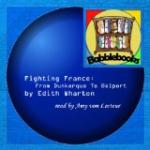June 22nd.
My first waking thought was: “How time flies! It must be the Fourteenth of July!” I knew it could not be the Fourth of that specially commemorative month, because I was just awake enough to be sure I was not in America; and the only other event to justify such a terrific clatter was the French national anniversary. I sat up and listened to the popping of guns till a completed sense of reality stole over me, and I realized that I was in the inn of the Wild Man at Cassel, and that it was not the fourteenth of July but the twenty-second of June.
Then, what—? A Taube, of course! And all the guns in the place were cracking at it! By the time this mental process was complete, I had scrambled up and hurried downstairs and, unbolting the heavy doors, had rushed out into the square. It was about four in the morning, the heavenliest moment of a summer dawn, and in spite of the tumult Cassel still apparently slept. Only a few soldiers stood in the square, looking up at a drift of white cloud behind which—they averred—a Taube had just slipped out of sight. Cassel was evidently used to Taubes, and I had the sense of having overdone my excitement and not being exactly in tune; so after gazing a moment at the white cloud I slunk back into the hotel, barred the door and mounted to my room. At a window on the stairs I paused to look out over the sloping roofs of the town, the gardens, the plain; and suddenly there was another crash and a drift of white smoke blew up from the fruit-trees just under the window. It was a last shot at the fugitive, from a gun hidden in one of those quiet provincial gardens between the houses; and its secret presence there was more startling than all the clatter of mitrailleuses from the rock.
Silence and sleep came down again on Cassel; but an hour or two later the hush was broken by a roar like the last trump. This time it was no question of mitrailleuses. The Wild Man rocked on its base, and every pane in my windows beat a tattoo. What was that incredible unimagined sound? Why, it could be nothing, of course, but the voice of the big siege-gun of Dixmude! Five times, while I was dressing, the thunder shook my windows, and the air was filled with a noise that may be compared—if the human imagination can stand the strain—to the simultaneous closing of all the iron shop-shutters in the world. The odd part was that, as far as the Wild Man and its inhabitants were concerned, no visible effects resulted, and dressing, packing and coffee-drinking went on comfortably in the strange parentheses between the roars.
We set off early for a neighbouring Head-quarters, and it was not till we turned out of the gates of Cassel that we came on signs of the bombardment: the smashing of a gas-house and the converting of a cabbage-field into a crater which, for some time to come, will spare photographers the trouble of climbing Vesuvius. There was a certain consolation in the discrepancy between the noise and the damage done.




